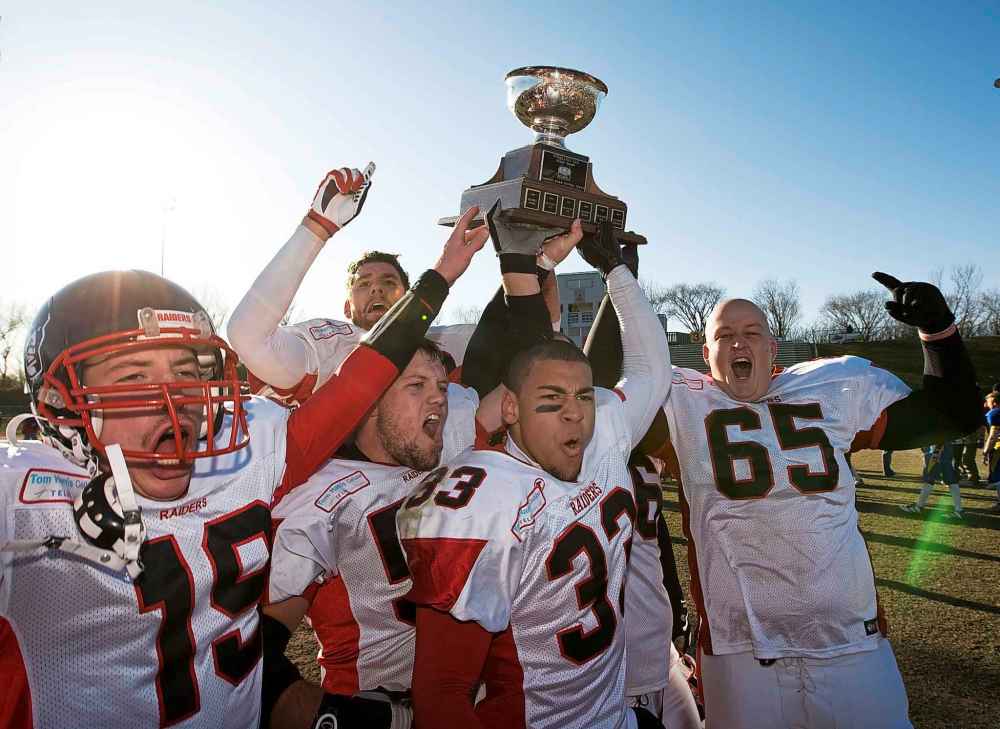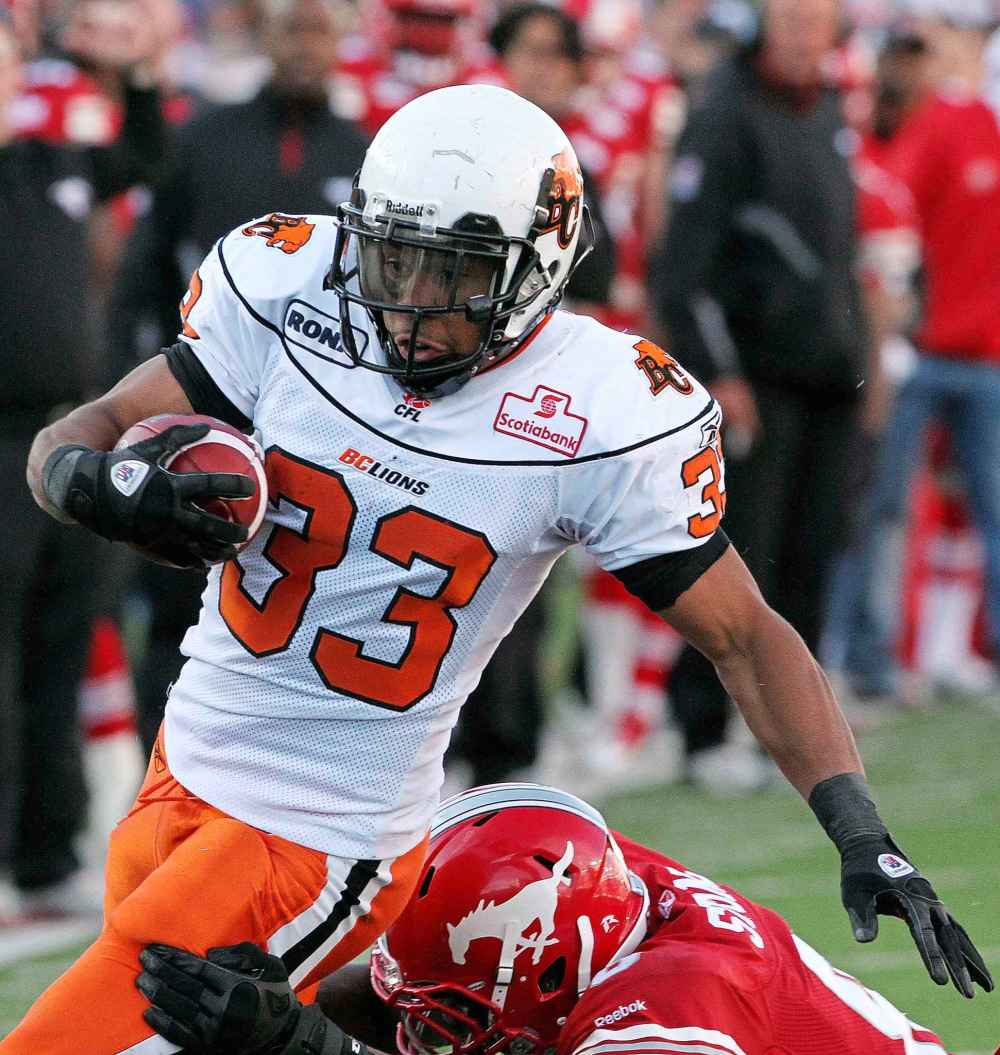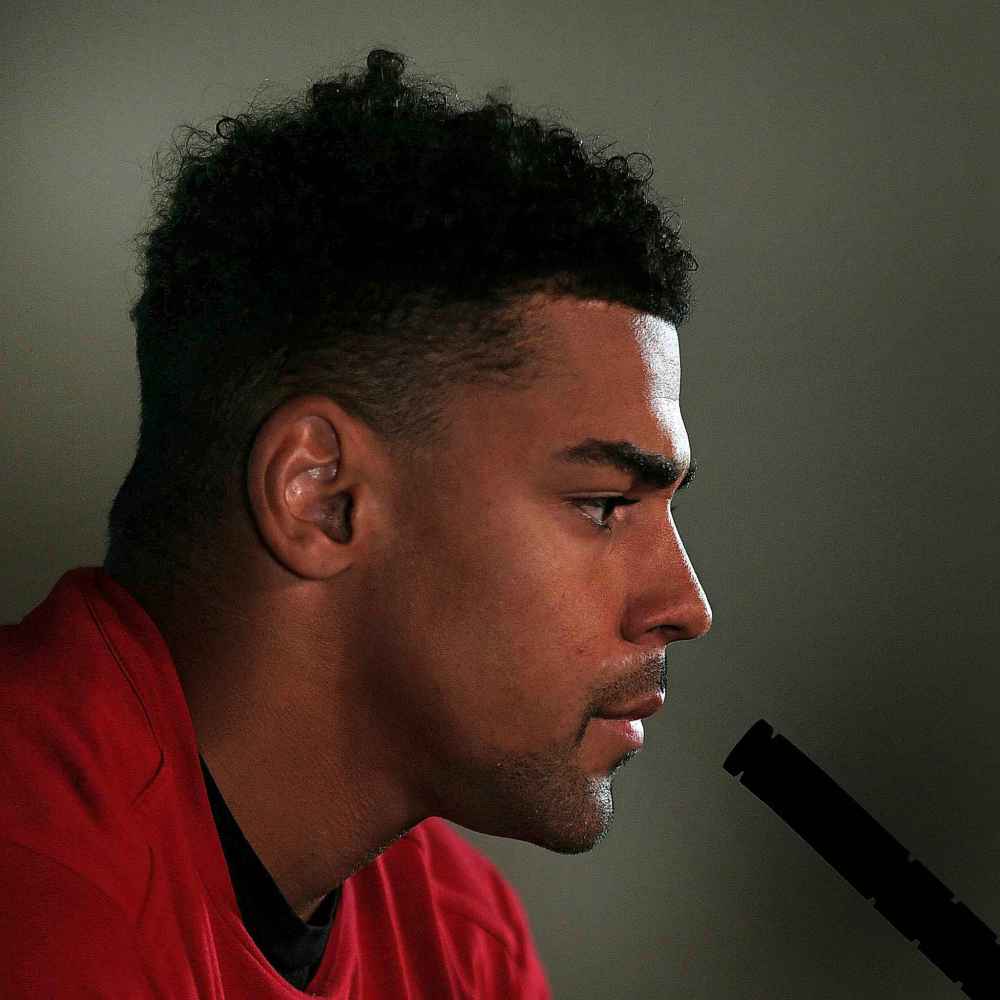A costly fumble Blue Bombers' seemingly ageless running back Andrew Harris devastated, bewildered after positive test for banned steroid he believes was in supplement
Read this article for free:
or
Already have an account? Log in here »
To continue reading, please subscribe:
Monthly Digital Subscription
$0 for the first 4 weeks*
- Enjoy unlimited reading on winnipegfreepress.com
- Read the E-Edition, our digital replica newspaper
- Access News Break, our award-winning app
- Play interactive puzzles
*No charge for 4 weeks then price increases to the regular rate of $19.00 plus GST every four weeks. Offer available to new and qualified returning subscribers only. Cancel any time.
Monthly Digital Subscription
$4.75/week*
- Enjoy unlimited reading on winnipegfreepress.com
- Read the E-Edition, our digital replica newspaper
- Access News Break, our award-winning app
- Play interactive puzzles
*Billed as $19 plus GST every four weeks. Cancel any time.
To continue reading, please subscribe:
Add Free Press access to your Brandon Sun subscription for only an additional
$1 for the first 4 weeks*
*Your next subscription payment will increase by $1.00 and you will be charged $16.99 plus GST for four weeks. After four weeks, your payment will increase to $23.99 plus GST every four weeks.
Read unlimited articles for free today:
or
Already have an account? Log in here »
Hey there, time traveller!
This article was published 26/08/2019 (2296 days ago), so information in it may no longer be current.
Andrew Harris has beaten the odds his entire life.
He grew up in a broken home, never knowing his real father as a child and, for parts, lived with a stepdad who was both emotionally and physically abusive to his mother. He ran with the wrong crowd as a teenager; at parties, it wasn’t unusual to see guns and violence.
Harris moved 19 times from the age of two to his high school graduation, when he finally left Winnipeg for Vancouver Island to play junior football and clean up his image. When the B.C. Lions noticed his talents years later, signing him to a practice-roster spot in 2009, Harris commuted hours each day by land, sea and air to attend both his team’s workouts.

When they told him it was impossible for a Canadian kid to play running back in the CFL, Harris pushed for it anyway. He would eventually be named the most valuable Canadian in the 2011 Grey Cup, transitioning seamlessly into the Lions’ full-time starter the following year. In 2016, when the Lions thought he was too old to continue playing at a high level, Harris signed with his hometown Blue Bombers, where he would win the CFL’s most outstanding Canadian award in 2017. He has been the league’s leading rusher the past two seasons and is on pace for a third straight title.
Despite all he’s been through, Harris’ biggest obstacle might just be the one currently staring him in the face. On Monday, he was suspended for two games after testing positive for metandienone, a banned substance under the drug policy of the CFL and the CFL Players’ Association.
Speaking with the Free Press Monday morning, an hour before the news of his suspension went public, the Bombers running back sat slouched in a chair at IG Field looking defeated. He got emotional, his head sinking into his hands on a number of occasions, and, at points in the 45-minute conversation, struggled to find words.

“I’ve had a lot of sleepless nights and I barely slept last night. Just thinking about having to talk about these things is very hard for me because I don’t have words for it, because it doesn’t make sense to me,” Harris, 32, said. “I have to own this, yes, I have to serve my suspension. But it’s very, very hard for me to face this because I didn’t intentionally do this.”
His lip now quivering, voice dipped, Harris added: “People are going to talk about it for who knows how long and for what? What comes out is, ‘Andrew is banned for a performance-enhancing drug’ and everyone is going to think something that’s not the case.”
Harris is adamant he didn’t knowingly take metandienone – known by its trade name, Dianabol — or D-Bol, for short — and is committed to getting answers to how the banned substance showed up in his system. He believes he has some strong facts in his favour.
The first thing Harris pointed out is the number of times he’s been tested this year, and over his career. He noted that he’s been asked to give blood and urine samples so often that he’s on a first-name basis with the tester. Whenever he does get called now to give a sample, it triggers a running joke among his teammates. While he doesn’t expect others to understand the humour, he insisted he understands the randomness of the tests and chances that come with being examined.
“I was tested four times one year, and that was the third time this year,” he said. “It’s frustrating but at the same time I understand that they need to have that policy in place to help mandate and control doping. For me, the hardest part about it is I wouldn’t even consider doing it for a lot of obvious reasons, but also because I get tested so much.”

Drug testing in the CFL, which is managed by the Canadian Centre for Ethics in Sports (CCES), is completely random. After going the entire 2015 season without a drug-testing program, the CFL and CCES reconnected a year later to form a new partnership that promised harsher punishments. Where the CFL used to test about 35 per cent of its players, it now administers enough tests to cover 100 per cent, though some players may be selected multiple times while others aren’t tested at all.
Harris’ first test this year was back in March, followed by another on July 2. Both came back negative. His third test, 10 days after his second, on July 12, came back positive. Harris admitted he was annoyed when his name was called for a third time, but only because he felt like he constantly was being called upon to provide a sample.
“I thought it was a joke. I didn’t believe it. Then the first thing I thought is I need to fight this because I know that I’m not doing this intentionally. I’m not a steroid user.”
– Andrew Harris
When he got the call from CFLPA executive director Brian Ramsay, on Aug. 7, confirming a failed test, Harris said he was in shock. The Bombers were getting ready to play the Calgary Stampeders the next day, and the news almost pushed him out of the barber chair he was sitting in.
“I thought it was a joke. I didn’t believe it,” he said. “Then the first thing I thought is I need to fight this because I know that I’m not doing this intentionally. I’m not a steroid user.”
Harris said when Ramsay informed him of the drug found in his system he didn’t know what it was, at first. It wasn’t until after he researched it online that he saw the trade name, Dianabol, and knew he was in serious trouble. Dianabol, after all, was a performance-enhancing drug with a history in sports doping.

“I was like, ‘Are you kidding me?!’ This substance is like a meathead steroid, used to get big and get jacked,” he said. “So my next thought is, ‘How did this get in my system? Where did this come from?’ It was just a struggle thinking about how this was going to play out, talking to Ramsay and just trying to decide what my approach was from here.”
Harris said of all the steroids to take, it didn’t make any sense for him to use Dianabol. Sure, he said, it’s a drug that can be used to get bigger and stronger — qualities that any running back would benefit from — but it also requires one to lift weights to receive its full benefits. It’s here where Harris said things don’t equate.
“It doesn’t add up with my position, my lifestyle or who I am…” Harris, needing a moment to control his emotions, said. “I’ve worked out six times this year, while most guys are at 30. If I was doing a steroid I would be in the gym working out more.”

Unlike most of his teammates, Harris doesn’t lift weights much during the season. He spends most of his time in the gym over the winter, but once football begins he uses a blend of massage, yoga and stretching to stay in shape. It was then, perhaps sensing that as a muscular athlete it was a tough sales pitch, he pulled out his phone. On it, was a picture of the team’s workout charts and while his teammates had multiple checkmarks beside their names — indicating the number of workouts for each week — Harris had none.
Harris hoped his first, and really only option, through the CFLPA might be able to save him. He requested the league do a B-sample, which is just another test of the urine sample that was first studied. This way, he could at least rule out the chance of a false positive, or whatever other possible errors might occur in the lab.
“It doesn’t add up with my position, my lifestyle or who I am… I’ve worked out six times this year, while most guys are at 30. If I was doing a steroid I would be in the gym working out more.”
– Andrew Harris
It would take three weeks before he would find out the results. In the meantime, Harris was continuing to have a career year, where he was on pace to eclipse 1,600 rushing yards — 200 yards more than any of his other nine seasons in the CFL.
In a 32-16 win over the Lions on Aug. 16, Harris moved into top-10 all-time for rushing yards and No. 1 among all Canadians for yards from scrimmage. After both marks were completed, the Bombers paused the game to allow fans to give Harris a standing ovation. Harris stood there and saluted the fans. It was supposed to be among the greatest moments of his career.

“And it wasn’t. It was a great moment but there was also a pit in my stomach. It was difficult,” said Harris. “I go from being on Cloud 9 to rock-bottom.”
It wasn’t until last Thursday, the day before the Bombers were to play in Edmonton against the Eskimos in a showdown for first place at Commonwealth Stadium, that Harris received the bad news. The B-sample had come back and it reaffirmed the test was positive.
Harris debated just sharing the news and starting the suspension immediately. The weight had become too much and had it not been so close to game time, which would mean sending a massive wrench into his team’s plans, he would have. The Bombers went on to defeat the Eskimos, 34-28 — thanks, in part, to Harris’s 89 rushing yards and one touchdown.
That marked the end of the road for any more reasonable appeals. He could have tried to drag it out with a formal appeal to the league, but it would have just delayed the inevitable. There was no denying he had the substance in his system, and all he had were guesses about how it might have got there.
“I’ve gone through a lot of adversity and a lot of things to get to this point and this is something that I really can’t control. I can’t control the outcome of how to deal with it,” he said. “At the end of the day, I have to be fully responsible for the things I put in my body but there was no intent to do this for performance-enhancing, or to…” he trailed off, looking back down at his hands.

Harris said he believed the positive test was the result of buying an over-the-counter men’s multi-vitamin that he purchased at a health store in Winnipeg. Described as “basically anti-oxidants and a natural testosterone enhancement,” Harris added it came recommended by the employee and when he read the back of the bottle it was all natural ingredients.
Harris didn’t mention the store or the name of the pills he was taking because he plans to get it tested, with the slight chance it shows a case of cross-contamination.
“If I was a small company, like they are, I don’t have a manufacturing plant. So what you do is you go send your pills to get packed somewhere else,” Harris explained. “So you don’t know who else is packing their pills in all these other places. They get those pills back and there could be cross contamination from that, there could be cross contamination from the actual ingredients they put in there. All I know is it was most likely from that pill.”
“At the end of the day, I have to be fully responsible for the things I put in my body…”
– Andrew Harris
There have been documented cases of cross-contamination affecting athletes’ drug tests, though they’re difficult to prove and vary from case-to-case. According to a January-February 2018 issue of Sports Health Journal, “Poor manufacturing processes, and intentional contamination with many banned substances continue to occur in dietary supplements” and that “certain sectors, such as weight-loss and muscle-building supplements, pose a greater threat because they are more likely to be contaminated.”
In the same review, it states: “Dietary supplement manufacturers are responsible for substantiating the safety of ingredients and ensuring product labelling, but they are not required to obtain (U.S. Food and Drug Administration) approval before producing or selling dietary supplements, nor are they required to demonstrate clinical efficacy.”
It bodes well that Harris had only “small traces” of the drug in his system. A source who had seen the test results confirmed Harris’s account. Tests aren’t made public, due to privacy issues, but there is a difference between small and large traces.

Still, there is no guarantee Harris will get the news he’s hoping for, especially since he was taking the same supplements at the time he passed the test on July 2. Instead, he’s left wondering why he even took the supplements in the first place without ensuring they were safe to ingest.
What makes it worse is everything else Harris has put in his body this year is protected by a NSF certification. (NSF International, formerly known as the National Sanitation Foundation, “is an independent, non-profit organization that certifies food service equipment and ensures it is designed and constructed in a way that promotes food safety.”)
“What I’ve learned from this is you really need to make sure 100 per cent what you’re putting in your body because you could jeopardize a great season, your job, your reputation…” Harris needed another moment before finishing, “and other things.”
One of the hardest parts, he said, was notifying his teammates. He had mentioned the situation to a select few, after some had noticed he wasn’t his usual self, especially after wins. On Sunday morning, with the entire team assembled, he broke the news about his failed test and that he wouldn’t be able to play for two important games against the Saskatchewan Roughriders.
Predictably, he received the full support of the room. There was also a handful of teammates on hand for Monday’s press conference. After Harris was done speaking, he was greeted with hugs as he made his way towards the exit.
“That was really tough because, all-in-all, we have something special here. I feel like I’m obviously a leader on this team and this is a big distraction, and this is a big deal and I want to be out there with them, battling with them. It was tough to have to sit there and tell them what I’ve been going through but also just telling them I know whole-heartedly that this was a mistake and you guys also need to be very careful going forward,” said Harris, adding he hopes to be an advocate for other athletes. “I wanted it to be a learning tool, I guess.”
What will be much tougher will be winning the court of public opinion. Harris, a five-time CFL all-star and certain future hall of famer, has already faced some major criticism online. For some, he will always been viewed as a cheater.
Harris understands his new reality. He just hopes, through his reputation of being a good person and contributor to the community, he’s earned enough goodwill to be given the benefit of the doubt. Until then, he’ll continue to work for more answers, hoping to help clear his name.
“I just hope people can look at my history, my track record and understand the type of person I am and the integrity I’ve had in my whole career,” he said. “Also, the number of times I’ve been tested in my career and the timeline between these two tests and the volume and I hope people understand this was a contamination case and not something where I was trying to cheat or getting an edge.”
jeff.hamilton@freepress.mb.ca
twitter: @jeffkhamilton

Jeff Hamilton
Multimedia producer
After a slew of injuries playing hockey that included breaks to the wrist, arm, and collar bone; a tear of the medial collateral ligament in both knees; as well as a collapsed lung, Jeff figured it was a good idea to take his interest in sports off the ice and in to the classroom.
Our newsroom depends on a growing audience of readers to power our journalism. If you are not a paid reader, please consider becoming a subscriber.
Our newsroom depends on its audience of readers to power our journalism. Thank you for your support.







